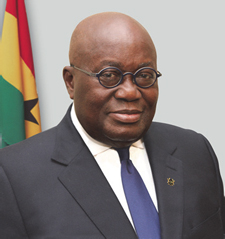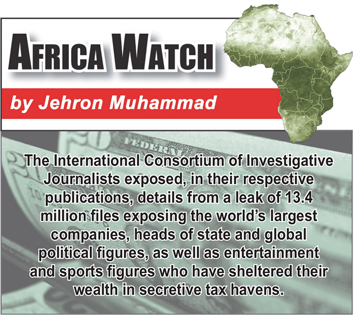Corporate tax dodging, corruption costing Africa billions of dollars
By Jehron Muhammad -Contributing Writer- | Last updated: Dec 12, 2017 - 11:10:14 AMWhat's your opinion on this article?

Nana Addo Dankwa Akufo-Addo recently urged African leaders to free their people from a mindset of “dependence”.
|
During the talk he chronicled how Ghana and Cote D’Ivoire, and much of Africa, through corruption and undervaluing the continent’s natural resources are being exploited.
Touching on the cocoa industry, President Akufo-Addo said it’s unfair that Ghana and Cote d’Ivoire, who produce 65 percent of the world’s output of cocoa, made less than $6 billion from an industry worth over $100 billion.
“If we simply ground and sold the cocoa in paste form, instead of selling the cocoa beans, we double our earnings. In much the same way as we would double our earnings from gold, if we sold it refined than in its raw state. We are determined to process these products,” he said. It is time African countries are responsible for processing their own resources and managing these resources well to generate wealth for the population, expected to hit two billion in the next 20 years, he said.
Not only does Africa suffer from the undervaluing of the cocoa that goes into Europe and America to make everything chocolate, it also suffers from the undervaluing of its mineral resources, as witnessed by Tanzania President John Magufuli’s indictment against Acacia Mining, a subsidiary of Barrick Gold, the world’s largest gold mining industry. The no-nonsense president’s administration calculates, during a period of nearly 20 years of undervalued mineral extraction, that Acacia owes Tanzania roughly $100 billion.

|
Africa’s annual losses, according to the coordinator of the African Minerals Development Center, Dr. Kojo Busia, is in excess of $80 billion, through illicit financial flows, which includes corruption and the siphoning of public money by corrupt African leaders.
A case in point is Teodoro Nguema Obiang Mangue, the vice-president of Equatorial Guinea and son of the president, who in a French court received a three-year suspended prison sentence, a $35 million fine and confiscation of all his French-held assets. He was accused of embezzlement and abusing his position as agriculture and forestry minister to siphon money for his personal use. He used stolen money, reported Transparency International, “to buy, among other things, a 20-room apartment worth an estimated $91 million in Paris, and a garage full of luxury cars.”
And then there’s the governing elite of oil rich Angola, with half its population living on $3.10 a day, helping the economy of its former colonial master Portugal, which had suffered from financial crises that forced it, reported the New York Times, to “obtain a $111 billion bailout from international creditors and downgraded its national debt, rated junk to this day.”
Home of probably Africa’s richest woman, worth $3.5 billion, and heavily invested, along with many other elite Angolans, in Portugal, is the daughter of the former president of Angola, Isabel dos Santos, who was recently removed from the chairmanship of Angola’s national oil company by newly-elected President Joao Lourenco. Between 2002 and 2015, Angola’s governing elite through companies and individuals “poured” $189 billion outside the country often into “opaque investments,” reported Catholic University of Angola’s Center for Studies and Scientific Research. Former foreign minister of Portugal, and current chair of the country’s largest private bank, Millennium BCP, Antonio Monteiro said investments from Angola had helped many Portuguese companies survive, including his bank.
Sudanese business mogul and philanthropist Mo Ibrahim says “corruption in Africa is taken totally out of context.” He told an African news correspondent, on the sidelines of the recent 2nd Africa Convergence Summit in Morocco, “Why only talk about African corruption? What about the Chinese corruption, American corruption and European corruption? We need to be really fair in looking at this issue of corruption. What about companies not paying taxes in Africa?”
Matthew Page, a researcher and analyst specializing in Nigeria, agrees. “What is lacking in that discussion is the facilitation that occurs in the international financial system and especially in the United States and United Kingdom financial systems.”
Page, who until last summer worked for U.S. intelligence as a researcher and an analyst, has just completed a book for Oxford University Press co-authored with John Campbell, “Nigeria: What Everyone Needs To Know,” that is part of a series.
During a phone interview from his home in London, Page, who is a consultant with Transparency International, said it’s the global “system and how it works. A big part of it is the ability of anyone, including Nigerian elites to set up anonymous shell companies. And you can do that in secrecy jurisdictions outside of (and inside) the U.S. and the U.K.”
Almost at the same time as this interview, the International Consortium of Investigative Journalists exposed, in their respective publications, details from a leak of 13.4 million files exposing the world’s largest companies, heads of state and global political figures, as well as entertainment and sports figures who have sheltered their wealth in secretive tax havens.
In 2016 Global Witness, a London- based nonprofit that exposes international corruption, via CBS News 60 Minutes discovered that the U.S. is one of the most popular places in the world to launder ill-gotten finances. This is done by moving dirty money through a maze of dummy corporations and offshore accounts that conceal the original source of these funds.
With the assistance of hidden cameras in law firms across Manhattan and without the lawyers’ knowledge, GW posed as the representative of a government official from a poor West African country, needing help moving millions of dollars of suspicious funds into the U.S.
The fictitious story created by GW was based on an actual money laundering case. GW called 50 New York law firms with experience in private asset protection and managed to get face-to-face meetings with 16 different lawyers in 13 firms.
The fake representatives’ pitch was designed to intentionally raise red flags and cause the attorneys to suspect the government officials’ millions came from illicit sources.
Of the 16 attorneys recorded by Global Witness, in these preliminary meetings, only one lawyer outright declined to participate showing the representative to the door.
Chairing the African Union’s anti-corruption crusade is Nigerian President Muhammadu Buhari, nominated by African leaders at the 29th Session of the Assembly of Heads of States and Governments of the AU in Addis Ababa in July. In a letter to AU Chair Alpha Conde, President Buhari thanked the chair and expressed his “readiness to accept this new important role and to reiterate my commitment to contribute toward our collective efforts to strengthen good governance and development on the continent.”
But if Buhari’s continent wide success is going to be judged by his anti-corruption campaign in Nigeria, maybe there needs to be a second look.
According to published reports, while Nigeria isn’t alone in the slowness of its courts, the fact that its ability “to cope with a slew of corruption cases is coming under scrutiny as elections approach in 2019.”
And with the 1,124 corruption cases before the courts being proof that Buhari’s Economic and Financial Crimes Commission, headed by Ibrahim Magu, has gained a measure of success, voters, if he chooses to run in 2019, will judge him based on convictions not arrests.
Leading the continent’s most visible anti-illicit financial flows campaign is former South African President Thabo Mbeki.
The chair of the African Union’s 10-member High-Level Panel on a series called Illicit Flows report, said, “large corporations having the means to retain the best available professional legal, accountancy, banking and other expertise to help them perpetuate their aggressive and illegal activities” are the main culprits.
These, based on the committee’s extensive research, Mbeki writes, “large commercial corporations are by far the biggest culprits of illicit outflows, followed by organized crime. We are also convinced that corrupt practices in Africa are facilitating these outflows, apart from and in addition to the related problem of weak governance capacity.”
INSIDE STORIES AND REVIEWS
-
-
About Harriett ... and the Negro Hollywood Road Show
By Rabiah Muhammad, Guest Columnist » Full Story -
Skepticism greets Jay-Z, NFL talk of inspiring change
By Bryan 18X Crawford and Richard B. Muhammad The Final Call Newspaper @TheFinalCall » Full Story -
The painful problem of Black girls and suicide
By Charlene Muhammad -National Correspondent- » Full Story -
Exploitation of Innocence - Report: Perceptions, policies hurting Black girls
By Charlene Muhammad -National Correspondent- » Full Story -
Big Ballin: Big ideas fuel a father’s Big Baller Brand and brash business sense
By Bryan Crawford -Contributing Writer- » Full Story






 Click Here Stay Connected!
Click Here Stay Connected!








